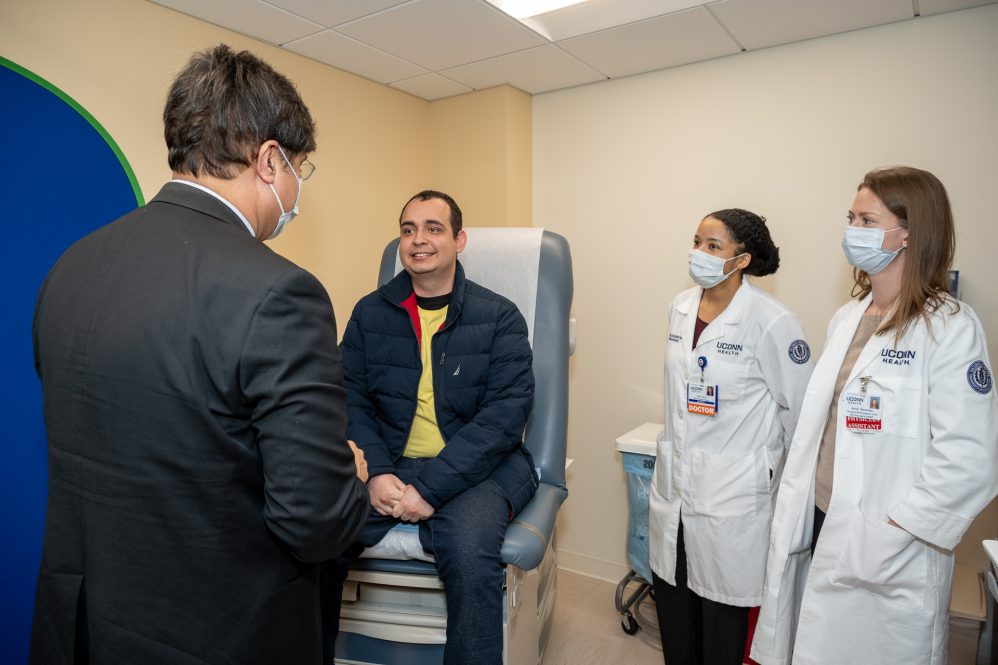“Merry Christmas!” exclaims Rafael Azevedo.
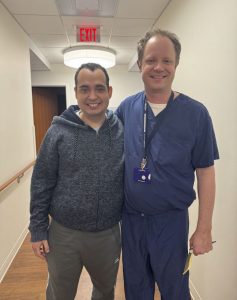
It’s a very Merry Christmas season indeed for Azevedo, all who love him, and all those who successfully cared for him at UConn Health.
“You saved my life,” Azevedo emotionally shares, with his wife Luana Diniz Tormin translating for him just days before Christmas at UConn Health’s Outpatient Pavilion after a follow-up outpatient visit with his surgical team.
“Our hearts are now full of hope,” heartwarmingly says his wife Tormin. “We have a lot of happiness. Many people are calling Rafael’s pain relief a Christmas miracle.”
She adds: “We are very happy.”
And the smile on Azevedo’s face really shows it.
Azevedo on Dec. 1, 2023 had successful advanced brain surgery to bring him relief finally from the severe facial and ear pain that he’s been battling for nearly a decade.
He had neuralgia of multiple cranial nerves. The intense pain caused by the disease is unfortunately known as “suicidal disease.”
The brain surgery for this rare disorder was made possible at UConn John Dempsey Hospital thanks to its surgical team’s expertise, its state-of-the-art operating rooms and its powerful imaging capabilities including high-tech surgical microscope with augmented reality (AR) computer-generated digital imaging to visually assist surgeons during complex brain surgery.
Thanks to the technology, surgeons performed microvascular nerve decompressions of the intermediate nerve and the glossopharyngeal nerve, along with the vagus nerve. In addition, a tympanic plexus neurectomy was performed to cure Azevedo’s intractable pain syndrome.
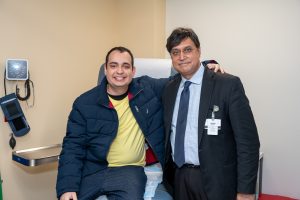
“We thought it was impossible to get to this day – but thanks to UConn Health we have done the impossible,” says his wife. “It’s been a successful journey.”
For Azevedo, “It’s a dream come true. I have the best doctors in the world.”
Azevedo came to Connecticut from Brazil for care at UConn Health in September right after visiting the United Nations to advocate for greater rare disease treatment options and funding for care. That’s when in-depth planning began for this personalized, complicated brain surgery at UConn Health by Chief of Neurosurgery Dr. Ketan Bulsara and ENT surgeon Dr. Daniel Roberts, co-directors of the Cranial Nerve and Brainstem Disorder Program.
“We have been all over Brazil and the world to find a cure. The cure was here in Connecticut.” says Tormin.
“We never thought we would find surgeons to treat Rafael and treat him with so much love,” says Tormin. “The surgery was long and dangerous, but they did the best they could – and it’s a perfect outcome. They saved Rafael’s life. We may have different cultures, and countries, but it’s love! There is love for humans in these surgeons’ hearts. We always feel it.”
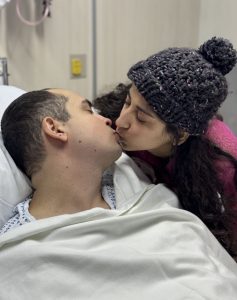
“Rafael looks good and is like a totally new man. His surgery outcome is a real gift and very special, just like this Christmas time of year,” says his surgeon, Roberts. “His care was a special opportunity to be able to help someone with a very rare condition.”
Roberts says, “The multidisciplinary teamwork at UConn Health really made it possible.”
The surgeons want to sincerely thank all the members of the team ranging from the clinic staff to the OR staff, ICU staff, inpatient floor staff, and the anesthesia team for their help, skill, and services allowing for a safe and successful procedure.
Azevedo learned about the surgical experience of Roberts and Bulsara through Brazilian neurosurgeon Rômulo Alberto Marques, a pain specialist at the Federal University of Goiás, who found the research published by the two UConn Health doctors after months of in-depth study on Azevedo’s rare case.
“We are grateful to Rafael and his family for the opportunity to care for him,” says Bulsara. “We are very happy the pain syndrome that has afflicted Rafael for 10 years has resolved. He can now progress on with the rest of his life and reach his ambitions of becoming a pilot.”
Bulsara says he and Roberts are grateful for the multidisciplinary excellence in the surgical and medical specialties at UConn Health and its leadership for facilitating this culture of excellence.
“It’s amazing,” says Tormin. “It is very special here at UConn, from the advanced operating room care to the little things like simple phone calls from the surgeons following-up. Similar to aviation, the surgeons at UConn Health were always doing a double-check to make sure things were safe and going well.”
“Many doctors we saw believed that pain relief was not possible,” says Azevedo’s wife. “He now has moments where he does not feel pain in his right ear and this had never happened before the surgery.”
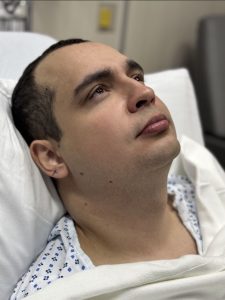
Azevedo shares: “Before surgery, and for the last 10 years, no major pain-killer medication had any effect. I can now manage my pain. Just over-the-counter pain medicine can help me now. It’s only a matter of time, in a few months as my body heals. It will continue to improve.”
What’s next for Azevedo?
“My next step is pursuing my dream of becoming an airline pilot,” says Azevedo, who also aims to help other rare disease patients like him too.
“Our work is based on the 2021 resolution in favor of rare diseases, launched by the UN. A fight so that this vulnerable population has access to swift diagnosis, effective treatment and that each individual can be reintegrated into society,” says Tormin.
Azevedo concludes: “After all my suffering, I don’t want to see others suffer, with no access to cures or doctors. It was hard for me and us. Most people in my condition commit suicide. I want to stop suicides from happening. I want to help take care of other people. I want to help people reach the treatment they need.”
UConn Health and its surgeons do too.
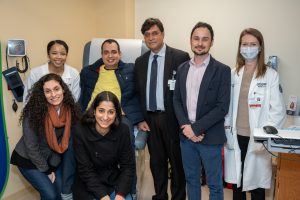
“We were very happy to work with Rafael and his family, friends and so many others, as well as our exceptional health care team to provide this wonderful outcome. Happy holidays to all!,” says Anne Horbatuck, RN, Chief Operating Officer for the UConn Medical Group and Vice President of Ambulatory Services at UConn Health.
